-
What We Do
- WHERE WE WORK
-
About Us
 Welcome Message from Carol Jenkins
Welcome Message from Carol JenkinsFor more than 90 years, World Learning has equipped individuals and institutions to address the world’s most pressing problems. We believe that, working together with our partners, we can change this world for the better.
On my travels, I’ve had the opportunity to meet with many of those who have joined us in this mission. In Baghdad, we’ve trained more than 2,300 Iraqi youth who are already giving back at home. In London, our partners in the TAAP Initiative strongly believe that we are all responsible to practice inclusion. And in Vermont, our Experiment in International Living and School for International Training participants prove every day that they have the tools and the determination to change the world.
Please join us in our pursuit of a more peaceful and just world.
- Get Involved
Media Center > Story
For Children in a Syrian Refugee Camp, Coding Is More Than a Skill
July 22, 2019
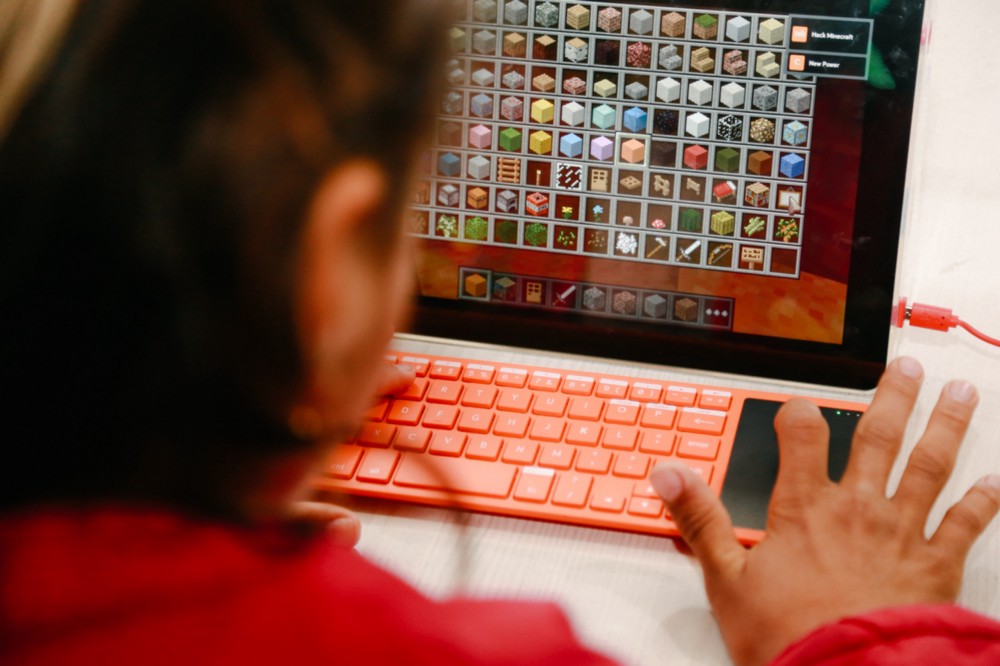
Kids across the world are learning how to code. In recent years, coding has come to be seen as one of the many skills that can prepare children for a rapidly changing economy.
But learning to code has taken on special meaning for the children of Arbat, a Syrian refugee camp in northern Iraq. Here, a new coding club is helping kids make friends, learn English, and rediscover passions they had to leave behind when they were forced from their homes.
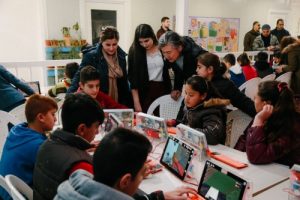
It’s also an opportunity to resume an interrupted education. According to the United Nations High Commissioner for Refugees (UNCHR), four million refugee children don’t attend school — let alone have access to competitive science and technology skills like coding. For Syrian refugees, the challenge is especially dire with two-fifths of school-aged children out of school.
Last year, World Learning teamed up with three forward-thinking partners in the private and civil sectors to address that challenge by launching Syrian Refugee Kids Can Code. Held five days a week in the Arbat activity center, this club offers children the opportunity to build and program computers using coding kits provided by the technology company Kano. Kurdistan Save the Children (KSC), a local NGO, runs the club’s daily operations, which are funded by the Catalyst Foundation for Universal Education, an organization that supports projects that encourage kids to pursue education.
Kids Can Code is deliberate about offering that encouragement. World Learning’s global education team adapted Kano’s coding curriculum to make it accessible for students in the camp by developing English vocabulary and grammar games to help the students — most of whom speak little to no English — use commands on their computers. Knowing that children need to feel safe and comfortable in order to learn, the team also trained KSC teachers to provide psychosocial support.
It’s already making a difference. Read on to find out how Kids Can Code has impacted the lives of Laila, Berivan, and twin sisters Nasrin and Rozhin.
LAILA
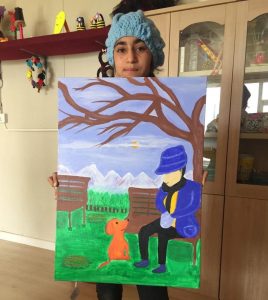
Laila grew up in Syria with her parents, a younger sister, and two younger brothers. She loved visiting her uncle, an artist, to watch him paint. “I spent hours looking at my uncle’s hands to see what he drew,” she says. “I never got bored.” At age five, she began to paint, too. Her uncle encouraged her to keep going and so she started painting every day. Art become her favorite subject at school.
But when Syria’s civil war broke out, Laila’s family had to leave everything behind. They fled to the Arbat refugee camp in Kurdistan, the northern region of Iraq, where life was more difficult than Laila had expected. “I was excited to start a peaceful life, but at the same time I was so sad to leave all my paintings and painting equipment [in Syria],” Laila says. Struggling to provide for their family, her parents couldn’t afford to buy new painting supplies. Laila had to give up painting entirely.
That changed in 2016. Kurdistan Save the Children opened an activity center — which had its own art department — inside the Arbat camp. Laila began visiting the activity center daily to practice painting once again. In 2018, she even had the opportunity to showcase her work at KSC’s Annual Kaziwa Exhibition.
Kids Can Code helped further ignite Laila’s passion for creativity. She loved learning how to code — especially using the Make Art app, which uses coding to creating drawings — and discovered she was quite good at it. She became a regular in the class.
Laila is determined to keep going in her art education so that someday she can grow up to become an artist — just like her uncle.
BERIVAN
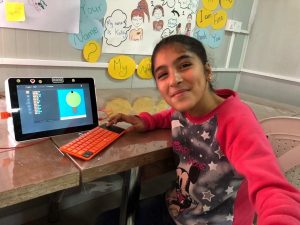
Berivan’s life started out quite ordinary: She lived happily in a small house in Damascus with her parents, younger brother, and younger sister. But in 2014, when she was 6, things changed. Her father had to go away for work, traveling during a time when Syria was engulfed in violent conflict. He never came back.
Not long after, the Syrian army destroyed Berivan’s house, forcing the family to move in with an uncle. Though Berivan was sad to lose her little pink room and her neighborhood friends, she got used to her new life. Playing with her cousins helped her forget some of the pain that she had suffered. Her family lived there for three years.
In 2017, though, the family decided to leave for Kurdistan. “All we wanted at that time was freedom,” Berivan says. Though it was difficult to once again leave everything behind, they knew they could live in peace in the Arbat refugee camp.
Now Berivan has a stable life. Her mother got a job cleaning the Arbat activity center, where Berivan participates regularly in Kids Can Code. She loves how it has improved her English language skills and taught her how to draw through coding. She works hard at her studies so that she can someday become a successful teacher and help her mother care for the family. “My mother is my hero,” Berivan says. “She never made us feel that we don’t have a father.”
NASRIN AND ROZHIN
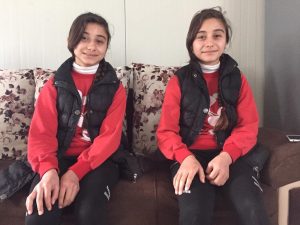
Nasrin and Rozhin never got to know their parents. Just weeks after the twin sisters were born in Syria, their father was killed in a demonstration. Shortly afterward, their mother remarried and traveled abroad, leaving her daughters behind. They never heard from her again.
Fortunately, an aunt took in the twins, deciding to raise them like her own children. Since then, she has done everything she can to be like a mother for her nieces — including fleeing to Kurdistan when they were 5 years old for their protection from the unrest in Syria.
Still, things were difficult upon arrival at the Arbat refugee camp. Their aunt struggled to find employment, resorting to collecting leftover bread to re-sell so she could pay the electricity bill. And while the girls started attending school every day, they didn’t have any friends and never went out to play.
That changed when they joined Kids Can Code. During the coding classes, Nasrin and Rozhin started to come out of their shells, making friends with other children at the camp. Their grades in their English class have improved through the course, too — and they even taught their aunt some of the English words and phrases that they’ve learned.
Life remains difficult for Nasrin and Rozhin. While the girls have always felt like they do have a mother — they call their aunt “mom” — they still mourn their father. “When we see children holding their fathers’ hands it breaks our heart, because we will never know how it feels to have a father to protect you,” Rozhin says. Yet, in spite of that sorrow, the twins remain full of life and dreams of a better future.
Watch this video from our partner Kano to learn more about Kids Can Code:





